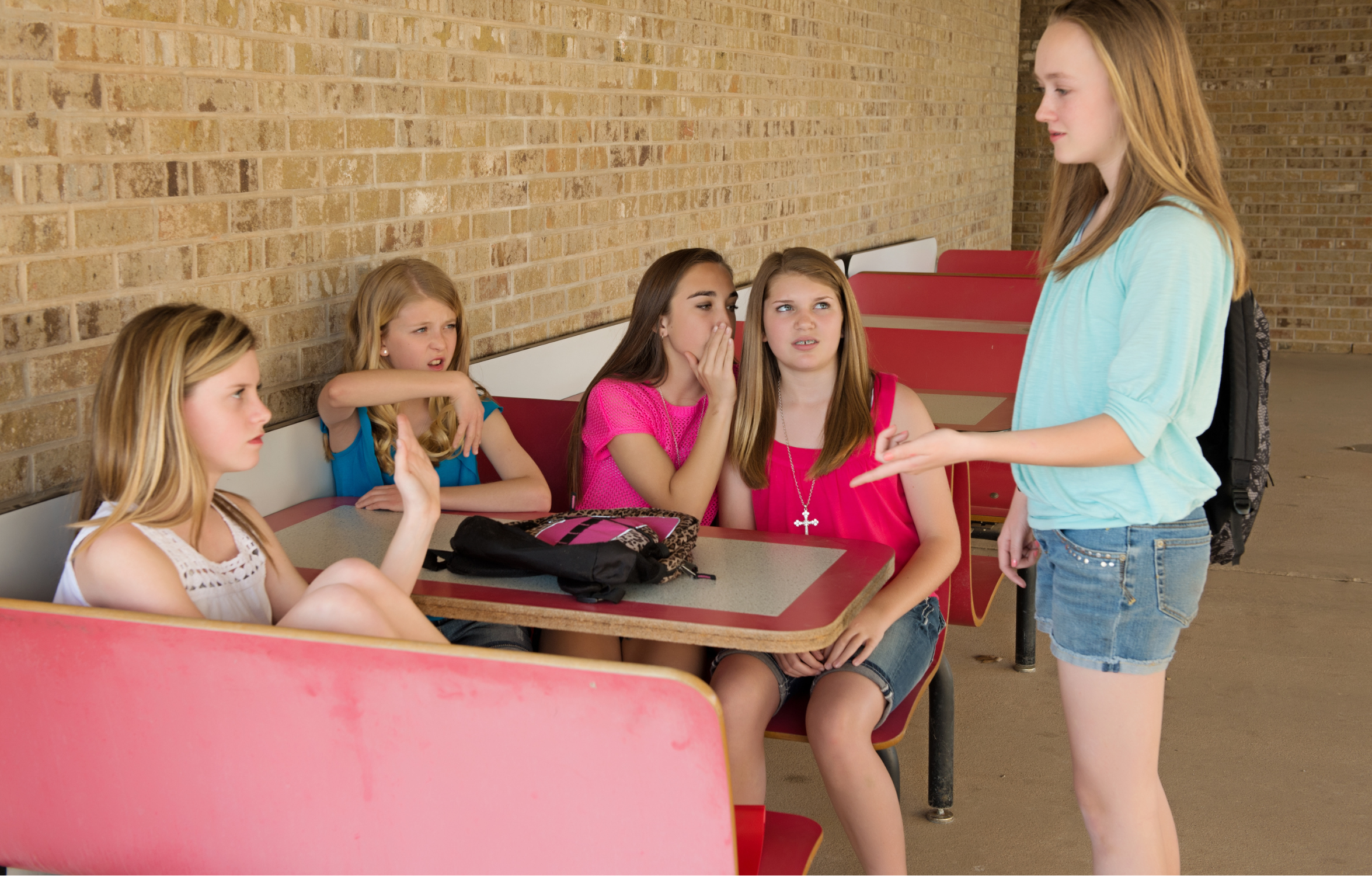
Middle school years are the season of life when bullying is most prominent and has an impact on the highest number of kids. A close cousin to bullying is social aggression which can be observed ad nauseam across middle and high schools, particularly among groups of females.
This, my friends, is where we find our MEAN GIRLS.
“I don’t understand,” sulked a young teen with her shoulders slumped. “It’s like they’re my friends but not my friends. I used to feel funny and happy when I was with them. Then all of the sudden, it was like I was out. I feel like I am at the bottom of the list. In all the group chats…it’s like they’re against me, or worse, I’m just ignored.”
 Social aggression is behavior directed toward harming other’s friendships, social status, or self-esteem. Girls hurt each other’s feelings through friendship manipulation, social exclusion, sneers, verbal comments, nasty notes, gossip, and spreading rumors.
Social aggression is behavior directed toward harming other’s friendships, social status, or self-esteem. Girls hurt each other’s feelings through friendship manipulation, social exclusion, sneers, verbal comments, nasty notes, gossip, and spreading rumors.
Our big question is…WHY? Why do girls do this to each other?
The study of MEAN GIRL behavior was long excluded from research because physical bullying seemed more easily identified, dramatic and worrisome. Who can care about gossip when boys are fist fighting in the cafeteria? However, the psychological scars of exclusion and manipulation can be as painful as physical ones. Recently, scientists started linking social aggression in females with emotions such as anger, jealousy, shame, sadness and fear. Girls are often raised to refrain from expressing negative emotions if they “want to be liked.” They are more sensitive when provoking situations than boys and feel worse about themselves after behaving angrily. They grow to be teens who feel negative emotions must be controlled and managed with a smile. They feel angry but want to appear nice.
So what are girls to do with their fury?
Rather than overtly expressing anger, they may cope by hitting girls where it hurts the most: social relationships. Girls inherently value relationships more than boys. It becomes clear to teens that the most effective way to harm girls and young women is by damaging their friendships and social standing. It is also a method that is less likely to be punished. How are teachers and principals supposed to discipline someone for excluding another? For not inviting someone to a party? For not responding to her texts? For spreading rumors? Social aggression is hard to identify and prove, and is often considered just part of growing up. According to science, it is considered “normal” among 5th through 10th graders. (Though if you tell that to a distraught hopeless 8th grader, I don’t expect it will make them feel any better.)
Anger is not the only reason for MEAN GIRL behavior. The purpose of instrumental social aggression can be any of the following:
- To alleviate boredom
- To seek attention
- To maintain social status
- To build group cohesion
- To set up group norms
With social aggression, there must be at least three people involved for the negative result to occur: the perpetrator, the victim and the follower(s). Peer followers spread the rumors, enact the exclusion, and observe the manipulation; without peers, social damage is not possible. “I used to start clubs. And clubs almost always had to be exclusive. So inevitably, we left people out,” reported an anonymous Knoxville mom. “Unfortunately, I think I was a mean girl.”
 There are MANY moms who reported girl scenarios in which a supposed friend was nice during one-on-one situations, but reverted to exclusion and manipulation during group interactions (e.g, group texts, social events, etc.). A reformed MEAN GIRL reports, “I was learning to make my audience happy from the beginning of time. If the girls thought she was smelly, I did, too. But to her face, I was her good friend. Until one day, she confronted me.”
There are MANY moms who reported girl scenarios in which a supposed friend was nice during one-on-one situations, but reverted to exclusion and manipulation during group interactions (e.g, group texts, social events, etc.). A reformed MEAN GIRL reports, “I was learning to make my audience happy from the beginning of time. If the girls thought she was smelly, I did, too. But to her face, I was her good friend. Until one day, she confronted me.”
How do we eliminate MEAN GIRL behavior? I wish I knew. I wish somebody knew! Programs that have had positive results in reducing widespread MEAN GIRL behavior included the following goals:
- Increase knowledge of what social aggression looks like and why it occurs.
- Help identify triggers for social aggression (e.g., what happened right before mean girl behavior occurred?).
- Broaden knowledge of respectful and honest strategies for resolving difficult social situations.
- Role play to promote empathetic understanding of others’ situations.
- Discuss group dynamics and social influence.
- Discuss different viewpoints (e.g., perpetrator, victim, follower) in activities involving social aggression (e.g., spreading rumors, alienating a friend).
- Emphasize positive leadership that is inclusive.
As parents, we can use car rides and dinner time to start conversations about what is happening in our daughters’ social circles.
Here are a few activities to try:
Family Dinner Time Role Play
This activity is designed to help develop empathy and better understanding of all viewpoints. Create a scenario in which someone spreads a specific rumor, deliberately excludes someone, or makes a mean comment on a group chat. Ask your child how each person might feel and what they might think during and after that situation. For example:
- How would you feel if you were the victim of the rumor?
- How would you feel if you started the rumor?
- How about if you were on the group chat and openly went along with the girl who started the rumor?
- If you knew I (your mom) was watching you speak poorly of someone, how do you think I would feel?
- What if this happened on a TV show…what would you think of each person involved?
Mother-Daughter Movie Night
Watch “Mean Girls” together (there is plenty of foul language so consider your rules). This activity aims to improve awareness of roles, triggers and motivation for social aggression. Encourage your teen/tween to brainstorm problem-solving strategies.
- Ask your daughter which character she admires most and which one she thinks is most like her.
- Are any of her friends a Regina George? Is anyone a Gretchen Weiner?
- Search for “triggers” that instigated social aggression.
- How did Caddy get sucked in?
- Why did people tolerate Regina’s vindictive behaviors?
- What needed to happen in order for change to occur?
Similar to bullying, the victims of MEAN GIRL behavior aren’t the only ones who need support and guidance. The perpetrators and followers also need help in identifying poor behavior and making change. Talk to your daughters. Listen to their take on group dynamics in their social circles. Guide them to make kind decisions, consider alternate viewpoints, discourage exclusiveness and distance themselves from chronic MEAN GIRL behavior.
References
Cappella, E. & Weinstein, R. (2008) The Prevention of Social Aggression Among Girls.
Horn, S. (2004) Human Development.



















